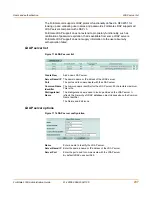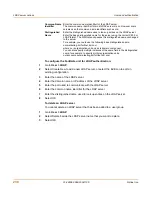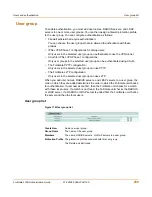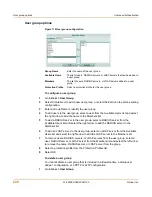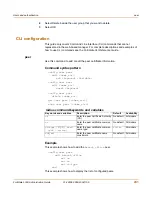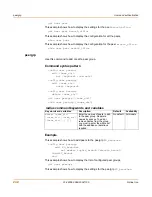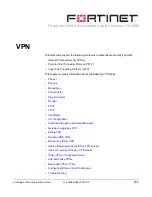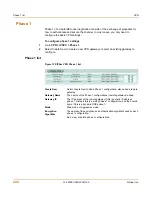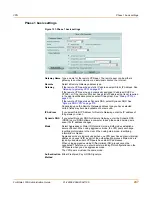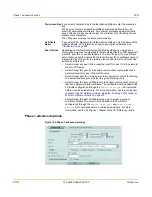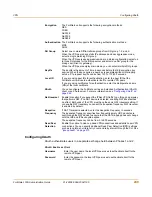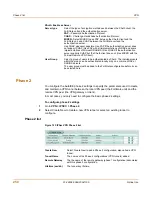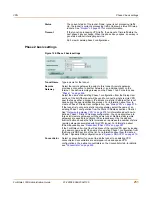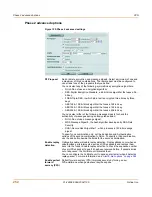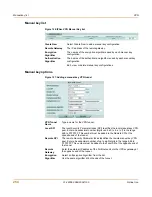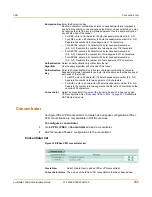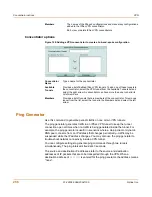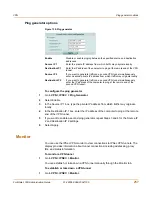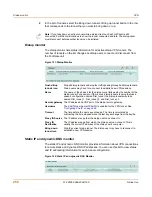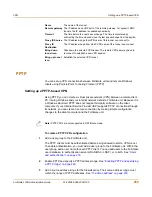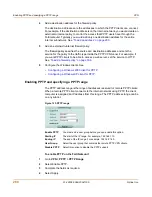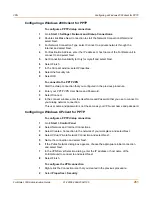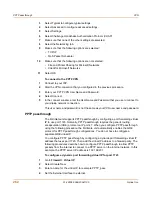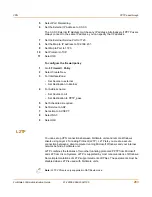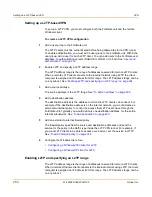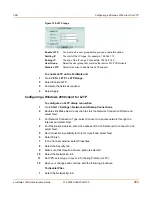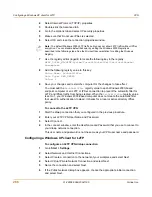
VPN
Phase 2 basic settings
FortiGate-100A Administration Guide
01-28006-0068-20041105
251
Phase 2 basic settings
Figure 124:Phase 2 basic settings
Status
The current status of the tunnel. Down, tunnel is not processing traffic.
Up, the tunnel is currently processing traffic. Unknown, status of Dialup
tunnels. See
“Monitor” on page 257
for more information.
Timeout
If the tunnel is processing VPN traffic, the amount of time left before the
next phase 2 key exchange. When the phase 2 key expires, a new key is
generated without interrupting service.
Edit, view or delete phase 2 configurations.
Tunnel Name
Type a name for the tunnel.
Remote
Gateway
Select the remote gateway to assign to this tunnel. A remote gateway
provides a connection to another network or an individual client on the
Internet. You define remote gateways on the Phase 1 tab. For details, see
“Phase 1” on page 246
.
Select the name of an existing Phase 1 configuration from the Dialup User
section of the list if the tunnel will be used to connect a single remote VPN
peer that uses either a dynamic IP address or a static IP address that is not
used during the peer identification process. For information about how to
create a Phase 1 Dialup User configuration, see
“Dialup VPN” on page 279
.
If the tunnel is to connect a static remote gateway, select the name of an
existing Phase 1 configuration from the Static IP Address section of the list.
See
“Gateway-to-gateway VPN” on page 278
for information about how to
define a Phase 1 Static IP Address configuration. You can associate up to
three static remote gateways with the same tunnel. Multiple static remote
gateways are needed to configure IPSec redundancy. Use the add and
subtract buttons beside the field to increase or decrease the number of static
remote gateways associated with this VPN tunnel. For information about
IPSec redundancy, see
“Redundant IPSec VPNs” on page 287
.
If the FortiGate unit will get the IP address of the remote VPN peer by looking
up a domain name, select the name of an existing Phase 1 configuration from
the Dynamic DNS section of the list. For information about how to create a
Phase 1 Dynamic DNS configuration, see
“Dynamic DNS VPN” on page 279
.
Concentrator
Select a concentrator if you want to add the tunnel to an existing VPN
concentrator. Concentrators are employed in hub and spoke VPN
configurations. You define concentrators on the Concentrator tab. for details,
see
“Concentrator” on page 255
.
Summary of Contents for FortiGate FortiGate-100A
Page 24: ...24 01 28006 0068 20041105 Fortinet Inc FortiLog documentation Introduction...
Page 72: ...72 01 28006 0068 20041105 Fortinet Inc Transparent mode VLAN settings System network...
Page 80: ...80 01 28006 0068 20041105 Fortinet Inc DHCP IP MAC binding settings System DHCP...
Page 114: ...114 01 28006 0068 20041105 Fortinet Inc Access profile options System administration...
Page 232: ...232 01 28006 0068 20041105 Fortinet Inc CLI configuration Firewall...
Page 244: ...244 01 28006 0068 20041105 Fortinet Inc peergrp Users and authentication...
Page 320: ...320 01 28006 0068 20041105 Fortinet Inc service smtp Antivirus...
Page 366: ...366 01 28006 0068 20041105 Fortinet Inc syslogd setting Log Report...
Page 380: ...380 01 28006 0068 20041105 Fortinet Inc Glossary...
Page 388: ...388 01 28006 0068 20041105 Fortinet Inc Index...

